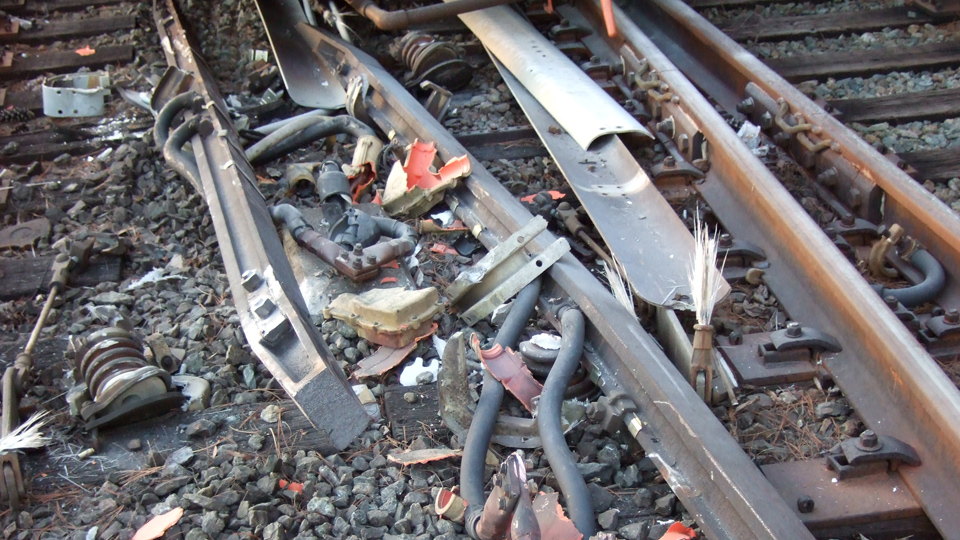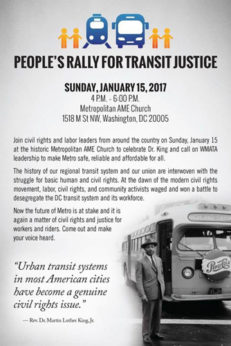
WASHINGTON (PAI) — Trap Thomas, a track inspector for Metro – the problem-ridden D.C. subway and flagship of the nation’s second-busiest transit system – was fired on Jan. 4. The fact that he was a whistleblower and spoke at a press conference about Metro’s problems and “safety culture,” or lack of it, may not be a coincidence.
Thomas’ firing highlights the continuing struggle over who is ultimately responsible for safety on the subway and in the buses of the Nation’s Capital, despite federal reports and independent studies that reveal Metro managers have a longtime culture of putting safety last.
Safety on Metro is important not just to the D.C. area but to the entire country. The system hosts millions of visitors yearly from all over the U.S., and it’s a key commuter tool for workers both at federal agencies, who keep government services going, and private firms. When Metro shuts down or curtails service, people who depend on federal services suffer.
But it’s also had a record of badly deferred maintenance and resulting accidents. Nine workers and 10 passengers have been killed in the last several years, including a fatal rear-end crash between two trains almost a decade ago.
The whole saga led Amalgamated Transit Union Local 689, which represents Metro’s workers, to commission two independent reports on Metro safety and release 23 recommendations for its improvement. The reports are the local’s latest try at exposing safety culture there, union President Jackie Jeter says. She raises safety issues at every Metro board meeting.
One recommendation: Empowering front-line workers to halt or slow trains when they discover unsafe conditions, without “undue interference” from supervisors. A second: A joint union-management committee to solve workplace safety issues – and to make solutions stick.
Whether Metro will pay attention is another matter. Jeter told the Jan. 4 press conference on safety that Local 689 often can’t get even basic data from Metro, despite the requirements of its contract with the agency. “Is there a cover-up? Yes!” she said.
The reports reinforce what federal findings have shown over the past several years: Metro’s managers put service first, ahead of safety for their passengers and their workers. And when something goes wrong, they blame the workers.
“The decision-makers are being shielded and protected, while the front-line workers are under fire. We are the ones whose lives are on the line every day, not those who sit in offices,” Jeter, a longtime bus driver, said.
It’s not firing for cause, either. When workers complained, or took action to improve safety, they got disciplined, demoted, or, in the case of Trap and six other workers let go on Jan. 4, fired. The reports and interviews of workers by the outside experts back that up.
“The health and safety concerns at WMATA” – the official name for Metro – “are very well-documented, starting with its own inspector general’s report back in 2010,” said Dr. Robin Gillespie, a national workplace safety expert. Trap gave a personal perspective on the issue.
“Back in March, I imposed speed restrictions of 15 mph” on one stretch of subway track just outside National Airport in suburban Virginia, Thomas explained. That’s also what federal manuals recommend when safety problems – in this case “track ties that were falling apart” – occur. But Metro rejected those manuals, and its response was to demote and then fire Trap.
The larger problem, said Jeter and her experts, is that firing whistleblowers is part of a culture that de-emphasizes safety in the 40-year-old Metro. That’s in contrast to practices at the nation’s largest system, New York, said one veteran track inspector, former Transport Workers Local 100 President Roger Toussaint. His local represents NYC transit workers.
“When WMATA misdirects you, you have to ask who is responsible for another derailment, another fire, another crash,” Toussaint said.

Thomas called Metro “a far different safety culture than in New York” where he worked for nine years, inspecting track, before moving to D.C. to take the same job for nine years. “In New York, when inspectors found defects, they called the mechanics and they immediately came out and fixed them. Here, they came out to fix it only if I slowed the trains down.”
To solve Metro’s problems, Jeter’s union released both independent analyses and the recommendations to reverse Metro’s unsafe culture. Besides the two above, others included:
- More time for track inspections, and more frequent inspections, especially of switches.
- Formal procedures for managers and track walkers to share information about rail track conditions “and jointly establish maintenance priorities.”
- Clear safety rules, performance measures and priorities. And “employees must be able to assess and trust supervisors’ concern about their safety.” Supervisors now emphasize a “rush-rush” culture to get maintenance workers off rail tracks so service can be restored.
- “Front-line employees must participate in hazard analysis.”
- Ordering Metro to enlist its workers to revise and strengthen its current safety manual.
- “Good-faith challenges” to unsafe conditions “must be available to workers and not responded to punitively.” And there should be open discussion of “competing pressures” on safety issues.
Those “competing pressures” include money, or lack of it. Metro does not have a dedicated funding source and depends on farebox revenue more than other mass transit systems, along with subsidies subject to local whims of its participating governments, Maryland, D.C., and Virginia. And Congress has skimped on funding, which in turn endangers safety, said ATU International President Larry Hanley.
“This is a system that has been underfunded and poorly managed. Even as we sit here” discussing the reports and recommendations, “Metro has been putting out notices blaming” safety problems “on those at the bottom,” he said.












Comments